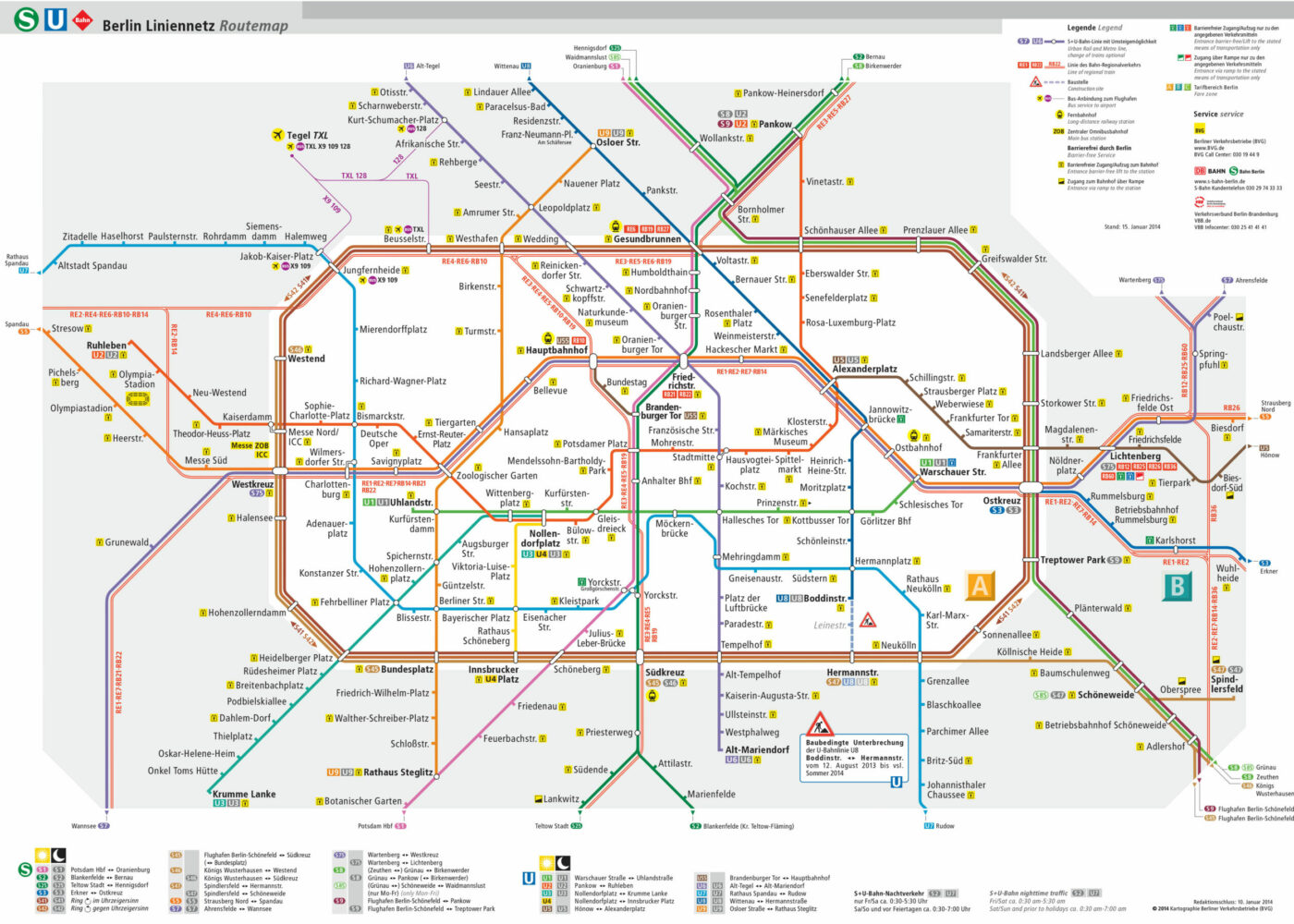Berlin Metro Map: Read It, Ride It, Love It
Looking for the easiest way to navigate Berlin? Start with the Berlin metro map. Then layer in the local names — U-Bahn (subway/metro) and S-Bahn (suburban/commuter rail) — plus the circular Ringbahn. This guide keeps it human, fast, and practical.
Quick Glossary (plain English first)
- U-Bahn
- subway/metro — dense inner-city grid, short hops, frequent trains.
- S-Bahn
- suburban/commuter rail — fast cross-town links & reach into suburbs.
- Ringbahn (S41/S42)
- circle line around the inner city; S41 clockwise, S42 counter-clockwise.
- Stadtbahn
- east–west S-Bahn trunk through the city’s central stations.
- Zones A/B/C
- A = inside the Ringbahn, B = to city boundary, C = greater Berlin (incl. Potsdam/BER).
How to Read the Berlin Metro Map
- Think in layers: U-Bahn for dense center hops; S-Bahn for fast cross-city; Ringbahn to switch directions.
- Navigate by nodes: Aim for major interchanges (e.g., Ostkreuz, Gesundbrunnen, Zoologischer Garten), then do a short last-mile hop.
- Ring logic: Unsure which train? On the ring, confirm S41 (clockwise) vs. S42 (counter) — both run frequently.
- City center = Zone A: If your journey stays inside the ring, you’re in A. Add B (outer districts) or C (Potsdam/BER) when needed.
- Mix with buses/trams: Buses fill gaps; trams knit the northeast. The map shows everything that one ticket covers.
Real-life example: East Side Gallery → Charlottenburg. Take the S-Bahn west along the trunk, change at Westkreuz, then a short U-Bahn or bus. No line memorization required.
Sightseeing with the Metro Map
- Museum Island & Unter den Linden: U5 to Museumsinsel/Unter den Linden or S-Bahn to Friedrichstraße and walk.
- Brandenburg Gate & Reichstag: U5/connection at Unter den Linden or S-Bahn Brandenburger Tor area.
- East Side Gallery: S-Bahn Ostbahnhof or Warschauer Straße, then stroll the river path.
- Charlottenburg Palace: U7 (Richard-Wagner-Platz) or S-Bahn Charlottenburg + short bus hop.
- Potsdam (day trip): Switch to ABC and ride S7 to Potsdam Hbf; local tram/bus to palaces.
Pro move: Use double-deck buses 100/200/300 between rail hops — it’s a mini city tour on your normal ticket.
Frequency & Micro-Etiquette
- Frequency (typical): U-Bahn every ~3–5 min in the core; S-Bahn ~3–10 min on main corridors.
- Night network: Night S-Bahn + night buses cover gaps; always check last/first trains.
- Etiquette: Stand right/walk left; let people off first; bags off the aisle; volume down late.
Small courtesies make packed trains calmer — and faster for everyone.
FAQ — Berlin Metro Map & Using the Network
Do I need to book public transport in advance?
No. It’s public transport: just buy a valid ticket for your zones and go.
Which ticket should I get for a full sightseeing day?
Often an AB day ticket wins on convenience if you’ll make several rides. Compare to singles in the BVG app.
Is the U-Bahn safe at night?
Generally yes on core routes. As always in big cities, stay aware, stick to lit areas, and ride in busier cars.
Can I use one ticket for U-Bahn and S-Bahn?
Yes. Within your selected zones, one ticket covers U-Bahn, S-Bahn, tram and bus.
How do I read Ringbahn directions?
S41 = clockwise, S42 = counter-clockwise. Trains are frequent — if you miss one, the next is minutes away.

